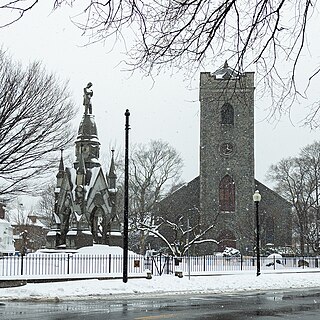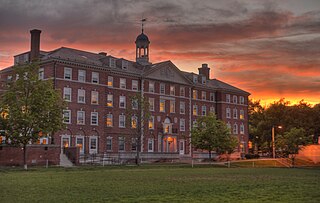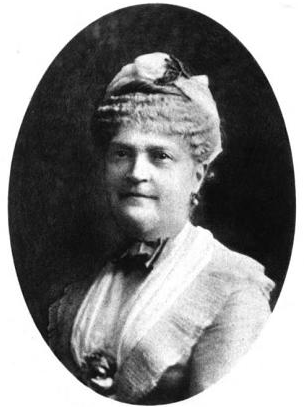
Roxbury is a neighborhood within the City of Boston, Massachusetts, United States.

John Eliot was a Puritan missionary to the American Indians who some called "the apostle to the Indians" and the founder of Roxbury Latin School in the Massachusetts Bay Colony in 1645. In 1660 he completed the enormous task of translating the Eliot Indian Bible into the Massachusett Indian language, producing more than two thousand completed copies.

Samuel Eliot Morison was an American historian noted for his works of maritime history and American history that were both authoritative and popular. He received his Ph.D. from Harvard University in 1912, and taught history at the university for 40 years. He won Pulitzer Prizes for Admiral of the Ocean Sea (1942), a biography of Christopher Columbus, and John Paul Jones: A Sailor's Biography (1959). In 1942, he was commissioned to write a history of United States naval operations in World War II, which was published in 15 volumes between 1947 and 1962. Morison wrote the popular Oxford History of the American People (1965), and co-authored the classic textbook The Growth of the American Republic (1930) with Henry Steele Commager.

Jamaica Plain is a neighborhood of 4.4 square miles (11 km2) in Boston, Massachusetts, United States. Settled by Puritans seeking farmland to the south, it was originally part of Roxbury. The community seceded from Roxbury during the formation of West Roxbury in 1851 and became part of Boston when West Roxbury was annexed in 1874. In the 19th century, Jamaica Plain became one of the first streetcar suburbs in America and home to a significant portion of Boston's Emerald Necklace of parks, designed by Frederick Law Olmsted.

West Roxbury is a neighborhood in Boston, Massachusetts, United States, bordered by Roslindale to the northeast, the village of Chestnut Hill and the town of Brookline to the north, the city of Newton to the northwest, the towns of Dedham and Needham to the southwest, and Hyde Park to the southeast. West Roxbury is often mistakenly confused with Roxbury, but the two are separated from each other by Roslindale and Jamaica Plain.
Praying Indian is a 17th-century term referring to Native Americans of New England, New York, Ontario, and Quebec who converted to Christianity either voluntarily or involuntarily. Many groups are referred to by the term, but it is more commonly used for tribes that were organized into villages. The villages were known as praying towns and were established by missionaries such as the Puritan leader John Eliot and Jesuit missionaries who established the St. Regis and Kahnawake and the missions among the Huron in western Ontario.

Cabot House is one of twelve undergraduate residential Houses at Harvard University. Cabot House derives from the merger in 1970 of Radcliffe College's South and East House, which took the name South House, until the name was changed and the House reincorporated in 1984 to honor Harvard benefactors Thomas Cabot and Virginia Cabot. The house is composed of six buildings surrounding Radcliffe Quadrangle; in order of construction, they are Bertram Hall (1901), Eliot Hall (1906), Whitman Hall (1911), Barnard Hall (1912), Briggs Hall (1923), and Cabot Hall (1937). All six of these structures were originally women-only Radcliffe College dormitories until they were integrated in 1970. Along with Currier House and Pforzheimer House, Cabot is part of the Radcliffe Quad.

Boston's diverse neighborhoods serve as a political and cultural organizing mechanism. The City of Boston's Office of Neighborhood Services has designated 23 Neighborhoods in the city:

Linus Bacon Comins was a Massachusetts politician who served as Mayor of Roxbury, Massachusetts and as a member of the United States House of Representatives from Massachusetts from 1855 to 1859.

The Boston Music Hall was a concert hall located on Winter Street in Boston, Massachusetts, with an additional entrance on Hamilton Place.

Forest Hills is a part of the Jamaica Plain neighborhood of Boston, Massachusetts, United States. Forest Hills is characterized by hilly terrain and wooded areas within and adjacent to its borders. In general, the area slopes upward from Hyde Park Ave and downward from Walk Hill Street.

Culture in North Omaha, Nebraska, the north end of Omaha, is defined by socioeconomic, racial, ethnic and political diversity among its residents. The neighborhood's culture is largely influenced by its predominantly African American community.
Bad Girrls Studios was a popular Boston gallery and performance space from 1994 to 2006 initially located at 59 Amory Street and later moved to 209 Green Street in Jamaica Plain. Founded by School of the Museum of Fine Arts student Jessica Brand, the artist-run studio hosted numerous artistic and community events. Bad Girrls Studios operated under the slogan "Art is Not A Luxury."

Clarence Howard Blackall was an American architect who is estimated to have designed 300 theatres.

Eliot Hall is a historic building at 7A Eliot Street in Jamaica Plain, Massachusetts, a neighborhood of Boston. It is sometimes referred to as "The Footlight Club," after "America's oldest community theatre," which owns and operates out of the building.
This article is a timeline of the history of the city of Boston, Massachusetts, USA.
The State of New York is a major center for all types of music. Its diverse community has contributed to introducing and spreading many genres of music, including salsa, jazz, folk, rock and roll, and classical. New York's plethora of music venues and event halls serve as popular markers which have housed many noteworthy artists.

Anna Eliot Ticknor was an American educator, who launched the first correspondence school in the United States, and pioneered public libraries in Massachusetts.
The Plymouth Theatre (1911–1957) of Boston, Massachusetts, was located on Stuart Street in today's Boston Theater District. Architect Clarence Blackall designed the building for Liebler & Co. Performers included Henry Jewett, Bill "Bojangles" Robinson, 8-year-old Sammy Davis, Jr., and Bette Davis. In October 1911, the touring Abbey Theatre presented Synge's Playboy of the Western World at the Plymouth; in the audience were W. B. Yeats, Isabella Stewart Gardner and Rose Fitzgerald Kennedy.

Jamaica Plain High School is a defunct four-year public high school that served students in ninth through twelfth grades in the Boston neighborhood of Jamaica Plain, Massachusetts, United States. The school held its first classes in 1849 and was last located at 144 McBride Street from 1979 until its closure in 1989.
















